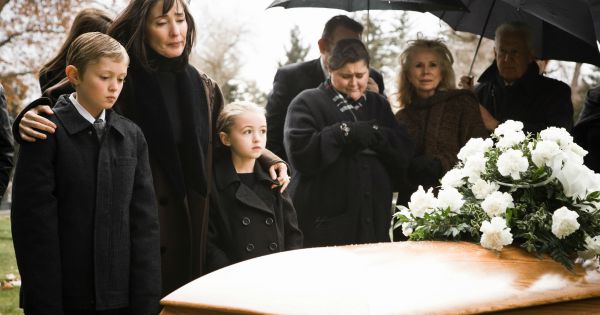8 Things Everyone Needs to Know Before Attending a Funeral

We all know that funerals can be quite emotionally charged events. As well as grieving for the person who has died, it can be difficult to know how to behave, what to wear and what to say, especially to the immediate family.
Funerals have changed a lot over the decades and each is very individual. But www.myageingparent.com has come up with some general expert advice you can follow that gives an answer to your most common questions about funeral etiquette.
MUST-SEE: Beloved Princess Diana Is Being Honored in a Big Way
1. Who can go to a funeral? Unless a family specifically asks for a private service, you don’t have to be personally invited. So if you knew the deceased, you are welcome to attend the service.
But if the family has said they want a private service, unless you receive an invite, you will have to attend the grave or the cremation memorial at another time to say your goodbyes. In a lot of cases, there will be a smaller family service followed by an open service where anyone can attend.
2. Can children go to a funeral? The short answer is ‘yes’, although it is always best if they know what to expect and are emotionally prepared. For a youngster to see a coffin or other adults crying can be very uncomfortable and upsetting so do sit them down and explain exactly what will happen beforehand so they can make a choice as to if they still wish to come.
Very young children can get fidgety and disruptive too if the service is long, so unless the family has explicitly said they are happy for them to be there, it may be better to ask someone to look after them while you go.
3. What should I wear? Traditionally, of course, families and friends would wear black, but in recent years this has begun to change. Nowadays, men will often wear a dark suit with a black tie, while women generally wear simple dresses.
It’s best to consult your invitation or the person who is organizing the funeral though. Sometimes it will be suggested that everyone wear colorful clothing to celebrate someone’s life, especially at memorial services. But unless they have specifically said this, it’s best to assume “dark and smart.”
4. What should I say? Speaking to the chief mourners either before or after the funeral is the polite thing to do, as long as they are not finding it difficult to talk. If you are unsure of what to say, then simply express your deepest sympathy and say a few words about how you knew the departed and a few kind words about them.
If you have been asked to say a few words at the service, then it’s best to share your important or happy memories of the deceased and say why they were so loved. Here’s our guide to writing a eulogy.
5. Where should I sit during the service? This can be quite difficult to judge. On the one hand, the front part of the church or crematorium should be left for family and close friends. On the other, if you sit at the back and have hearing problems you may not be able to hear the readings.
If you are not a close relative, then it is best to try and sit in the middle or back of the church.
6. What follows the service? Once the service has finished, everyone will follow the minister and chief mourners out of the church or crematorium chapel. At church ceremonies, family members and friends will walk down with the coffin to its grave where the vicar or priest will speak as the coffin is lowered into its final resting place.
Family and friends may lay some flowers down and say their last goodbyes once the minister has finished speaking. At a service in a crematorium chapel, the coffin will usually remain on view until a curtain is pulled in front of it. The flowers from mourners will often be displayed in a special area.
After this, there is often a gathering. The order of service should tell you whether everyone is welcome. And these are traditionally the times where – over a drink or two – family and friends can remember the person they have lost and celebrate the happiness they brought.
7. Should I send flowers? If you are a close friend to the deceased, sending flowers is a traditional way to show your sympathy and the family will really appreciate it. These can be sent to the church, to the home of the departed person’s family or sometimes direct to the funeral director.
A little card with a short, personal message should go with the flowers. If the families ask for donations to be made to charity instead of flowers then you should follow their request. Some religions, such as Judaism, do not have flowers at funerals, so it’s best to check with the family or other close friends before sending any.
8. What should I do if I am asked to be a pallbearer? Being asked to be a pallbearer is a great honor and should always be accepted unless you have a special reason why you can’t. Pallbearers should ideally get to the church or crematorium at least half an hour before the service begins, so that the funeral director can talk you through what you will be doing.
MUST-SEE: Family Was Honoring Twins They Lost When Someone Shocking Jumped into the Photo with a Jaw-Dropping Reveal
–Katharine Wootton
via Yours.co.uk












